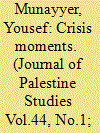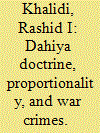|
|
|
Sort Order |
|
|
|
Items / Page
|
|
|
|
|
|
|
| Srl | Item |
| 1 |
ID:
136599


|
|
|
|
|
| Summary/Abstract |
The frequent and repeated large-scale attacks on the Gaza Strip have had a blunting effect, with the oft-cited statistics and casualty tolls failing to convey the suffering and trauma entailed by the relentless violence perpetrated on the Palestinian population. In this reflection, Laila El-Haddad interweaves personal stories about families and LOVED ones into her essay about the summer 2014 assault on her home of origin. She humanizes her subjects and focuses on their day-to-day experiences rather than on the enumeration of the damage, destruction, and devastation wrought. She reminds her readers that in spite of being beleaguered and besieged, Gazans are not beaten down and are resorting to art and other forms of creative expression to memorialize the dead, the displaced, and the wounded, and to remind the world of their humanity.
|
|
|
|
|
|
|
|
|
|
|
|
|
|
|
|
| 2 |
ID:
136593


|
|
|
|
|
| Summary/Abstract |
During the summer of 2014, the U.S. government once again offered the State of Israel unwavering support for its aggression against the Palestinian people. Among the U.S. public, however, there was growing disenchantment with Israel. The information explosion on social media has provided the public globally with much greater access to the Palestinian narrative unfiltered by the Israeli lens. In the United States, this has translated into a growing political split on the question of Palestine between a more diverse and engaged younger population and an older generation reared on the long-standing tropes of Israel’s discourse. Drawing analogies between this paradigm shift and the turning point in the civil rights movement enshrined in Mississippi’s 1964 Freedom Summer, author and scholar Robin Kelley goes on to ask whether the outrage of the summer of 2014 can be galvanized to transform official U.S. policy.
|
|
|
|
|
|
|
|
|
|
|
|
|
|
|
|
| 3 |
ID:
136597


|
|
|
|
|
| Summary/Abstract |
Without explicitly referencing the so-called Dahiya doctrine, Israel accompanied its summer 2014 onslaught against Gaza with a formidable media campaign of vilification and dehumanization, which enabled it to prosecute Operation Protective Edge with minimal criticism. Despite repeatedly violating the norms of international law, Israel portrayed itself as facing a near-existential threat from Palestinians who, in turn, were characterized as irrational actors and blamed for their own deaths. Israel’s discursive dominance resulted from the failure of an official Palestinian media strategy and from the news media’s reticence to question Israel’s actions or challenge its narrative.
|
|
|
|
|
|
|
|
|
|
|
|
|
|
|
|
| 4 |
ID:
136598


|
|
|
|
|
| Summary/Abstract |
Discourse and public opinion on the question of Palestine—and every other issue for that matter—are largely shaped by themainstreammedia. Palestine remains remote for the average American consumer of information who is generally less concerned with foreign affairs than with the domestic issues that directly impact daily life. In moments of crisis, however, media coverage of Palestine increases significantly, sometimes to the point of saturation. Such “crisis moments,” despite being few and far between, can have a significant and lasting impact on shaping public opinion, rendering it critically important to understand and analyze the coverage of Israel’s latest assault on Gaza—as well as the discourse surrounding the issue.
|
|
|
|
|
|
|
|
|
|
|
|
|
|
|
|
| 5 |
ID:
136591


|
|
|
|
|
| Summary/Abstract |
IN JULY 2014, Israel launched its third and most massive military assault in a period of less than six years on the 1.8 million people of the Gaza Strip. In so doing, it killed over twenty-one hundred Palestinians and wounded more than eleven thousand. The vast majority of the thirteen thousand casualties were civilians, and well over half of them were women, children, old people, and the disabled. This latest massacre of the innocents provides the occasion for the Journal of Palestine Studies (JPS) to offer a special dossier centered on Gaza.
|
|
|
|
|
|
|
|
|
|
|
|
|
|
|
|
| 6 |
ID:
136596


|
|
|
|
|
| Summary/Abstract |
Since the summer 2014 Israeli assault on the Gaza Strip, the calls have grown louder for Palestine to ratify the Rome Statute and join the International Criminal Court (ICC). Palestinian factions across the political spectrum have indicated that they would support such a move. But in spite of gaining the status of an observer-state at the United Nations, Palestine has yet to join the ICC. While acceding to the Rome Statute and filing the application to the ICC is a relatively straightforward process, there are numerous risk factors involved. This article investigates a variety of possible scenarios and their likely outcomes, including the legal mechanisms necessary for acceding to the Rome Statute, and alternative measures that the Palestinian leadership might envisage.
|
|
|
|
|
|
|
|
|
|
|
|
|
|
|
|
| 7 |
ID:
136601


|
|
|
|
|
| Summary/Abstract |
In this overarching March 2014 inaugural lecture at the newly established Center for Palestine Studies at the University of London’s School of Oriental and African Studies (SOAS), Palestinian historian Walid Khalidi, while reminiscing about the genesis and evolution of the new narrative on the 1948 war, provides fresh analyses of both the Balfour Declaration and UN Security Council Resolution 242. He also addresses such pressing Palestinian issues as the one-state/twostate debate, Boycott, Divestment and Sanctions (BDS), and the Hamas/Fatah relationship. He concludes by highlighting the potentially catastrophic nature of the disputes centering on Jerusalem’s Muslim holy places and the threat to the Middle East posed by the policies of Benjamin Netanyahu, “the most dangerous political leader in the world today.”
|
|
|
|
|
|
|
|
|
|
|
|
|
|
|
|
| 8 |
ID:
136592


|
|
|
|
|
| Summary/Abstract |
At the end of the fifty-day Israeli offensive on the Gaza Strip, neither Israel nor Hamas had achieved their stated goals there: the armed resistance was still standing (despite the massive damage the territory and its people sustained) and the crippling Israeli siege was not lifted. Rather, this essay argues, it was Israel’s far right that emerged the victor. Not only did religious nationalists and secular extremists outflank the right-wing establishment, they justified the brutality of their actions in the military battle zone with messianic pronouncements, and fanned the flames of genocide in the public arena. The far right’s wartime success represented the culmination of a strategy Israeli sociologist Baruch Kimmerling has called “politicide,” a coinage denoting the partial or total destruction of a community of people with a view to denying them self-determination.
|
|
|
|
|
|
|
|
|
|
|
|
|
|
|
|
| 9 |
ID:
136594


|
|
|
|
|
| Summary/Abstract |
In this no-holds-barred essay, former New York Times Middle East correspondent and Pulitzer Prize–winning journalist Chris Hedges examines how the United States’ staunch support provides Israel with impunity to visit mayhem on a population which it subjugates and holds captive. Notwithstanding occasional and momentary criticism, the official U.S. cheerleading stance is not only an embarrassing spectacle, Hedges argues, it is also a violation of international law, and an illustration of the disfiguring and poisonous effect of the psychosis of permanent war characteristic of both countries. The author goes on to conclude that the reality of its actions against the Palestinians, both current and historical, exposes the fiction that Israel stands for the rule of law and human rights, and gives the lie to the myth of the Jewish state and that of its sponsor, the United States.
|
|
|
|
|
|
|
|
|
|
|
|
|
|
|
|
| 10 |
ID:
136600


|
|
|
|
|
| Summary/Abstract |
Below, we present a letter by Dr. Sara Roy in response to a statement by Holocaust survivor and Nobel Peace laureate Elie Wiesel. Roy’s letter, which appeared on the CounterPunch website on 9 September 2014, is a denunciation of Wiesel’s implicit allegation that Palestinian “terrorists,” rather than Israeli soldiers, are responsible for the fate of Gaza’s children.
Wiesel’s statement appeared under the photo of a Hamas fighter with the headline “Jews rejected child sacrifice 3,500 years ago. Now it’s Hamas’ turn.” It was featured in an advertisement run by major English-language newspapers in late July and early August 2014, including the New York Times, the Wall Street Journal, the Washington Post, and the Guardian. (The London Times refused to run the ad, saying it would have caused “concern amongst a significant number of Times readers.”) The ad was produced, paid for, and circulated by the New Jersey–based This World: The Values Network, a not-for-profit organization led by Rabbi Shmuley Boteach.
|
|
|
|
|
|
|
|
|
|
|
|
|
|
|
|
| 11 |
ID:
136595


|
|
|
|
|
| Summary/Abstract |
The fifty-day war on the Gaza Strip during the summer of 2014 was far more devastating than previous conflicts. But it was neither unprecedented nor unpredictable, being, in effect, Israel’s twelfth war against Gaza. This essay contends that if the seemingly endless cycle of violence is to be broken, the latest conflict must be placed in its proper context: the eleven wars on Gaza that preceded this one and Israel’s obdurate refusal to countenance the national rights of the Palestinians or recognize Gaza as an integral part of Palestine.
|
|
|
|
|
|
|
|
|
|
|
|
|
|
|
|
|
|
|
|
|